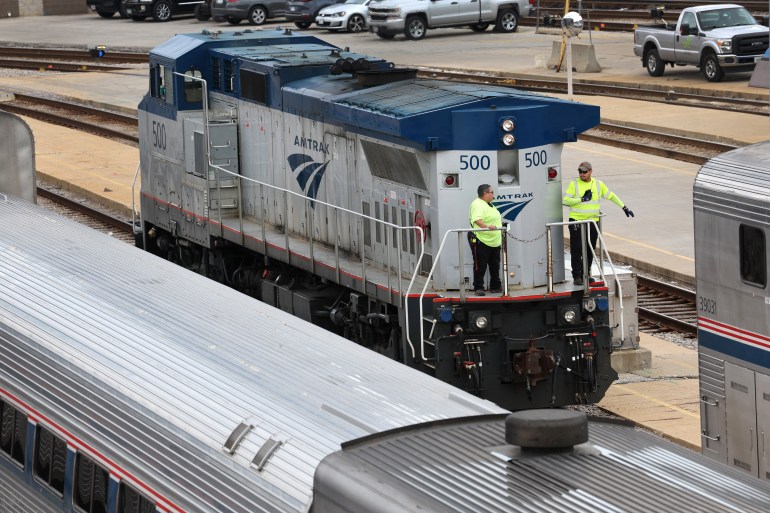President Biden hails US railway labour deal as ‘big win’
Railway companies and labour unions reach ‘tentative’ agreement to avoid strike that risked major disruptions.

Leading US rail companies and labour unions have reached a tentative deal to avert a major strike over the weekend that could have hit food and fuel supplies across the United States two months before crucial midterm elections.
White House and cabinet officials secured the deal in the early hours of Thursday morning after 20 hours of intense talks brokered by the Biden administration to prevent the shutdown.
Keep reading
list of 3 itemsSeveral dead as train derails in US state of Montana
Who is the man driving UK’s ongoing rail strikes?
Speaking at the White House, President Joe Biden called the deal a “big win for America” and thanked business and labour representatives for their efforts.
“I’m optimistic that we can do this in other fields, as well,” Biden said. “Unions and management can work together for the benefit of everyone.”
Earlier, the Democratic leader said in a statement that the tentative deal was “a win for tens of thousands of rail workers who worked tirelessly through the pandemic to ensure that America’s families and communities got deliveries of what have kept us going during these difficult years”.
“The agreement is also a victory for railway companies who will be able to retain and recruit more workers for an industry that will continue to be part of the backbone of the American economy for decades to come.”
This is a win for the economy and for the American people.
Rail workers will get better pay, improved working conditions, and peace of mind around their health care costs.
I thank both the unions and rail companies for negotiating in good faith. https://t.co/9JNtLynsch
— President Biden (@POTUS) September 15, 2022
The tentative deal now goes to the unions to be voted on, the Reuters news agency reported, citing an unnamed source familiar with the negotiations.
Even if those votes fail, a rail shutdown that could have happened as soon as midnight on Friday has been averted for several weeks, the source said.
A rail shutdown could freeze almost 30 percent of US cargo shipments, and the Association of American Railroads had warned that a strike would bring 7,000 trains to a halt, costing $2bn per day.
Biden administration officials hosted labour contract talks into the night on Wednesday in hopes of securing an agreement with the unions, which represent 115,000 workers.
“Moments ago, following more than 20 consecutive hours of negotiations at @USDOL, the rail companies and union negotiators came to a tentative agreement that balances the needs of workers, businesses, and our nation’s economy,” tweeted US Secretary of Labor Marty Walsh.
Negotiations between railways, including Union Pacific, Berkshire Hathaway’s BNSF, CSX, Norfolk Southern and Kansas City Southern, and a dozen unions had stretched for more than two years, leading Biden to appoint an emergency board to help break the impasse.

Biden regularly expresses strong support for workers but is also struggling to avoid further economic damage ahead of midterm congressional elections in early November.
Voters are already worried about soaring prices in the post-pandemic economy, where supply chain issues have been a constant scourge and annual inflation has surged to a 40-year high.
Biden in July appointed an arbitration panel to facilitate the discussions and head off a work stoppage.
Farmers and retailers had warned that a strike would hit US supply chains already battered by the COVID-19 pandemic.
“There is no real substitute for moving agricultural goods,” American Farm Bureau Federation President Zippy Duvall said on Wednesday. The National Retail Federation called freight rail “critical to the retail supply chain”.
“The timing coincides directly with peak shipping season for the winter holidays, and a rail strike at this juncture would be just one more significant, inflationary shock to an economy that is already reeling,” warned NRF CEO Matthew Shay before Biden’s announcement.
Workers’ demands
The railroad industry has slashed almost 30 percent of its workforce over the last six years, cutting pay and other costs as they increased profits, stock buybacks and dividends for investors.
For instance, profits at billionaire Warren Buffett’s Berkshire Hathaway, which owns BNSF, rose 9.2 percent in the most recent quarter to $1.7bn.
But the number of US railway workers continues to drop from over 600,000 in 1970 to about 150,000 in 2022, according to the Bureau of Labor Statistics, due to technology and cost-cutting.
That often means that many industry workers are on call at all hours, waiting to respond at short notice to work for days at a time. The latest deal includes a 24 percent wage increase over a five-year period from 2020 through 2024.
Biden, who has called himself the most union-friendly president in history and attacked companies for raking in “excessive” profits, said the tentative deal would give workers “better pay, improved working conditions, and peace of mind around their health care costs”.
But the president is not yet out of the woods when it comes to supply-chain labour issues.
Some 22,000 union workers at 29 West Coast ports that handle almost 40 percent of US imports are also in high-stakes labour contract negotiations.